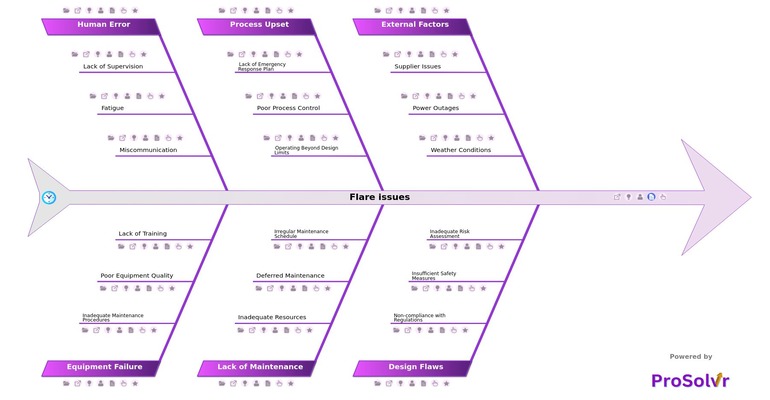RCA of Flare Issues
Flare systems in petrochemical plants are critical safety devices designed to burn off excess gases, preventing overpressure and potential explosions. Root cause analysis (RCA) is an essential tool for addressing flare issues, allowing plant operators to systematically identify and eliminate underlying causes rather than merely addressing symptoms. Conducting RCA through a fishbone diagram helps visually map out all potential causes of a problem, categorizing them into key areas. By systematically examining each category, teams can pinpoint specific causes contributing to flare problems, such as faulty pressure control valves, inadequate maintenance practices, or improper operating procedures.
Flare issues, including excessive flaring, smoking, or inefficient combustion, can arise from various factors. Common problems include equipment malfunctions, process upsets, and operator errors. These issues not only lead to environmental concerns due to increased emissions but also represent significant energy losses and can disrupt plant operations. Ensuring that flare systems operate efficiently is crucial for both safety and regulatory compliance in petrochemical plants.
Once root causes are identified using a visual RCA tool like ProSolvr, targeted corrective actions can be implemented to prevent recurrence. If equipment failure is identified as a root cause, measures such as enhanced maintenance schedules, equipment upgrades, or operator training can be introduced. Similarly, if human error is identified, additional training, improved communication, or procedural changes may be necessary. By addressing the root causes of flare issues, petrochemical plants can enhance safety, reduce emissions, and improve overall operational efficiency.
Who can learn from the Flare Issues template?
Root Cause Analysis (RCA) of Flare Issues provide valuable insights for various stakeholder
- Operations and Maintenance Teams: These teams are directly responsible for the day-to-day running and upkeep of petrochemical plants. Learning from the RCA template helps them understand common issues related to flare systems, enabling them to take proactive measures to prevent similar problems in the future.
- Process Engineers: Process engineers can use the RCA template to identify design flaws or process inefficiencies that contribute to flare issues. This knowledge helps them optimize plant processes and improve overall operational efficiency.
- Safety and Compliance Officers: These professionals are responsible for ensuring that the plant operates safely and in compliance with regulations. The RCA template provides them with insights into potential safety hazards related to flare systems, allowing them to develop better safety protocols and compliance strategies.
- Plant Management: Plant managers can use the RCA template to make informed decisions about resource allocation, maintenance scheduling, and investment in new technologies. Understanding the root causes of flare issues enables them to prioritize actions that enhance plant reliability and safety.
- Training and Development Teams: These teams can incorporate lessons from the RCA template into training programs for new and existing employees. By focusing on areas like human error, equipment failure, and process control, they can develop targeted training that reduces the likelihood of flare issues arising in the future.
Why use this template?
Using Gen-AI powered root cause analysis (RCA) for flare issues in petrochemical plants offers significant benefits by enabling a systematic approach to identifying and addressing the underlying causes of problems rather than just treating the symptoms. RCA helps pinpoint specific factors such as equipment failures, process upsets, or human errors that contribute to flare inefficiencies, allowing for targeted corrective actions. By resolving these root causes, plants can enhance safety, reduce environmental impact, improve regulatory compliance, and minimize costly operational disruptions, ultimately leading to more reliable and efficient plant operations.
Draft and create a template for problem analysis in ProSolvr by smartQED.








